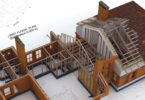By Chao Wang, COO of Arize
Global demographic trends are shifting toward urbanization. To accommodate the steadily growing world population, city planners, developers and government agencies have begun to adapt how they plan for a consistent influx of people moving to urban centers. Many are looking toward smart cities as sustainable, cost-effective and forward-thinking solutions.
A key factor in the success of smart cities will be a sustainable housing model, one that can accommodate large populations in dense city centers and surrounding areas. Multi-family properties are often viewed as an ideal housing solution for densely populated areas, and transforming these properties into smart apartments will be vital in the development of smart cities.
Some skeptics are worried smart cities will turn society into an over-surveilled, robot-run world. But that doesn’t have to be the final outcome. Following are two ways smart-apartment technology can help develop sustainable, human-centered smart cities that add a level of convenience to residents’ lives.
Human-centered approach
Technology is often perceived as an advancement that causes a disconnect between people. In a recent market trend report conducted by Arize, findings show that smart-apartment technology actually improves engagement within communities, leading to increased levels of satisfaction and higher occupancy rates. Smart-apartment technology, if designed properly, can increase engagement between property managers and residents, adding a new layer of connectivity within apartment communities. For example, some providers offer technology that provides real-time alerts and notifications to residents and property managers whenever a device is triggered with abnormal information.
As smart cities are beginning to spring up around the world, many cities have launched pilot programs. As the progress of these pilots begins to provide us with information on how to develop effective smart cities, it has become clear that people will need to be at the core of the development process. Instead of just haphazardly installing smart devices in properties, smart-home ecosystems will need to be customized to each person’s living situation. When choosing a smart-home provider, it is important to ensure the selection will add value to the community and meet its specific needs.
While it is important to make sure the appropriate smart-home ecosystem will be utilized for smart cities, it is also critical to factor in the impact smart-apartment tech will have on other major players in the housing market, such as real estate agents. According to Arize’s recent market survey, 65% of baby boomers and 86% of millennials would pay more for an apartment with intelligent upgrades. Smart-apartment tech will provide real estate agents with new ways to lead into an upsell. Real estate agents will have to train themselves and learn about advantages and functions of smart tech in order to fully communicate its purpose and benefits to potential renters.
The battle against climate change
Smart-property technology, such as smart thermostats, automate the home’s climate control, saving energy and delivering cost savings to both property owners and residents. In addition to only using energy and resources when needed, the automated component of smart technology improves resident comfort, convenience and satisfaction. The ultimate goal of a smart apartment is to utilize a single smart-home ecosystem (as opposed to an array of devices from different brands) to streamline automation among integrated devices, allowing the home to know what the resident needs even before the resident does. Upcoming generations will look to incorporate sustainable living approaches into their everyday lifestyles. Smart technology delivers a level of automation that will help residents practice sustainability without friction, and this will be a cornerstone of future smart cities.
For more smart home tech solutions and resources, visit arizehub.com.
Photo: iStock.com/DrAfter123








